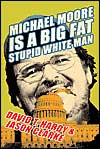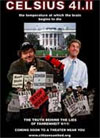'Sicko': Heavily Doctored, by Kurt Loder. MTV.com. June 29, 2007:
Unfortunately, Moore is also a con man of a very brazen sort, and never more so than in this film. His cherry-picked facts, manipulative interviews (with lingering close-ups of distraught people breaking down in tears) and blithe assertions (how does he know 18,000* people will die this year because they have no health insurance?) are so stacked that you can feel his whole argument sliding sideways as the picture unspools. The American health-care system is in urgent need of reform, no question. Some 47 million people are uninsured (although many are only temporarily so, being either in-between jobs or young enough not to feel a pressing need to buy health insurance). There are a number of proposals as to what might be done to correct this situation. Moore has no use for any of them, save one.
As a proud socialist, the director appears to feel that there are few problems in life that can't be solved by government regulation (that would be the same government that's already given us the U.S. Postal Service and the Department of Motor Vehicles). . . .
The problem with American health care, Moore argues, is that people are charged money to avail themselves of it. In other countries, like Canada, France and Britain, health systems are far superior — and they're free. He takes us to these countries to see a few clean, efficient hospitals, where treatment is quick and caring; and to meet a few doctors, who are delighted with their government-regulated salaries; and to listen to patients express their beaming happiness with a socialized health system. It sounds great. As one patient in a British hospital run by the country's National Health Service says, "No one pays. It's all on the NHS. It's not America."
That last statement is even truer than you'd know from watching "Sicko." In the case of Canada — which Moore, like many other political activists, holds up as a utopian ideal of benevolent health-care regulation — a very different picture is conveyed by a short 2005 documentary called "Dead Meat," by Stuart Browning and Blaine Greenberg. These two filmmakers talked to a number of Canadians of a kind that Moore's movie would have you believe don't exist. . . .
What's the problem with government health systems? Moore's movie doesn't ask that question, although it does unintentionally provide an answer. When governments attempt to regulate the balance between a limited supply of health care and an unlimited demand for it they're inevitably forced to ration treatment. This is certainly the situation in Britain. Writing in the Chicago Tribune this week, Helen Evans, a 20-year veteran of the country's National Health Service and now the director of a London-based group called Nurses for Reform, said that nearly 1 million Britons are currently on waiting lists for medical care — and another 200,000 are waiting to get on waiting lists. Evans also says the NHS cancels about 100,000 operations each year because of shortages of various sorts. Last March, the BBC reported on the results of a Healthcare Commission poll of 128,000 NHS workers: two thirds of them said they "would not be happy" to be patients in their own hospitals. James Christopher, the film critic of the Times of London, thinks he knows why. After marveling at Moore's rosy view of the British health care system in "Sicko," Christopher wrote, "What he hasn't done is lie in a corridor all night at the Royal Free [Hospital] watching his severed toe disintegrate in a plastic cup of melted ice. I have." Last month, the Associated Press reported that Gordon Brown — just installed this week as Britain's new prime minister — had promised to inaugurate "sweeping domestic reforms" to, among other things, "improve health care."




